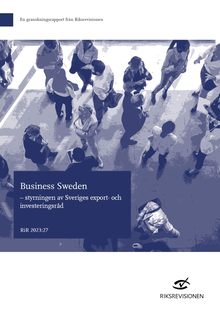Weak governance and unclear effects of Business Sweden’s activities
There are several shortcomings in how the Government manages the partly state-owned Business Sweden. It is recommended that the Government consider whether the current unique hybrid form of the operations is best suited to achieving central government goals.

PHOTO: SANJERI
Business Sweden (the Swedish Trade and Invest Council) is a key player in central government promotion of exports and foreign investments in Sweden.
Business Sweden is neither a government agency nor a company, but rather a unique hybrid founded on an agreement between the central government and the business sector. The operations are financed with both central government funds (about 60 per cent) and sales revenue (about 40 per cent).
The Swedish National Audit Office’s audit shows that governance of Business Sweden has several shortcomings, and is therefore not effective in achieving the central government goals for the operations.
The main problem is that the owners have not sufficiently dealt with the ambiguities that result from Business Sweden being neither a government agency nor a company. This is manifested, for example, in the lack of sufficient monitoring and control mechanisms.
“The unique operational form, financing and ownership structure place great demands on governance to enable Business Sweden to meet the central government goals. Governance is deficient in several important respects,” says Deputy Auditor General Claudia Gardberg Morner.
The audit also shows that Business Sweden’s sales operations are not conducted on competitively neutral terms, but have advantages over competitors. These advantages have neither been adequately managed nor justified, and the Government has not analysed whether they are justified or in breach of EU state aid rules. The Government’s ownership control of the sales activities is far too limited and it has, for example, not sought to set economic goals.
Furthermore, there is no cohesive and comprehensive governance framework for Business Sweden. The Government has, for example, not analysed and taken a position on which public law principles and rules Business Sweden is to apply in its central government-financed operations.
“This refers to matters such as the principles on equal treatment, objectivity and impartiality in public activities – which exist to ensure that public funds are used correctly,” says Katarina Magnusson, project leader for the audit.
The Swedish National Audit Office also notes that Business Sweden’s reporting of its central government remit contains several shortcomings and risks overestimating Business Sweden’s contribution. Despite this, the Government presents this reporting in its Budget Bill without describing to the Riksdag which shortcomings and uncertainties exist. All in all, this means that the Riksdag has received inadequate reports of the results of Business Sweden’s operations.
Recommendations in brief
The Government is primarily recommended to review which operational form is best suited for achieving the central government goals for Business Sweden’s operations.
If the Government retains the current form, the recommendations include to
- analyse and clarify which public law principles and rules should apply to Business Sweden
- develop monitorable goals
- ensure the quality and increase transparency in the reporting of Business Sweden’s central government remit
- clarify which of Business Sweden’s competitive advantages are justified
- analyse the risk that Business Sweden collects unauthorised state aid
- develop governance of Business Sweden’s sales operations.
See the report for the full recommendations.
Press contact: Olle Castelius, phone: +46 8-5171 40 04.
Presskontakt: Olle Castelius , telefon: 08-5171 42 06.
Share in social media and by e-mail
Contact form
Send your questions or comments via the form below and we will make sure that they reach the right member of staff. Please state if your question concerns the information on this particular page.


